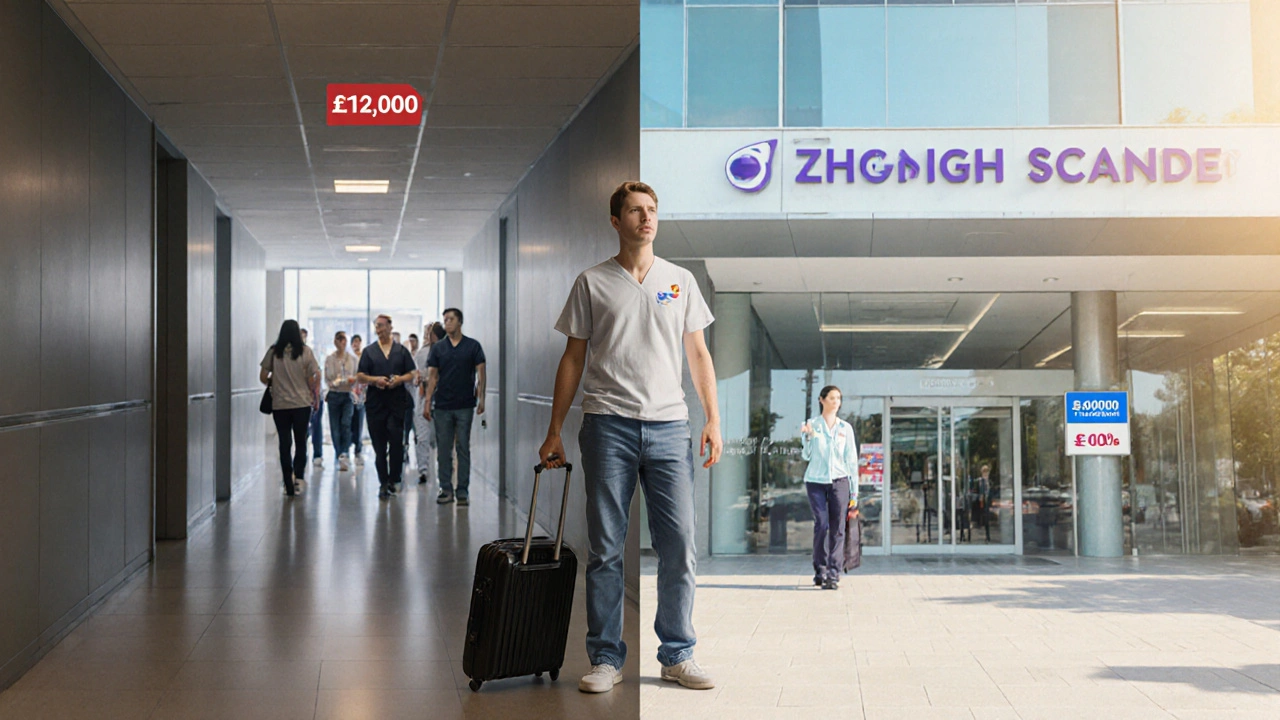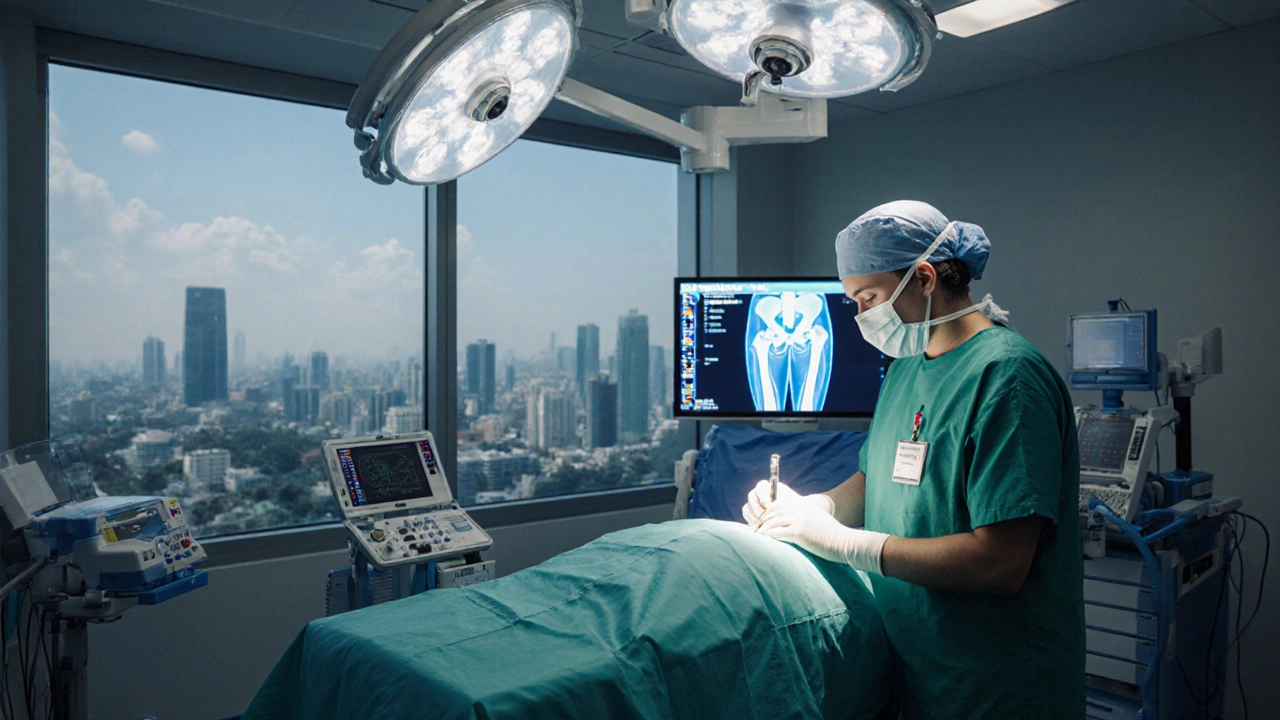Why People Choose Medical Tourism: Cost Savings, Quality Care, and Convenience
 Oct, 16 2025
Oct, 16 2025
Medical Tourism Cost Calculator
Calculate Your Medical Tourism Savings
Estimate potential savings when considering medical tourism. Based on 2024 data from the International Medical Travel Journal.
How Medical Tourism Works
Medical tourism offers significant cost savings while maintaining high-quality care. Many international hospitals hold JCI or ISO accreditation, ensuring safety and quality standards comparable to top Western facilities.
Common procedures with cost savings:
- Knee replacement: £12,000 in UK vs £4,000 abroad
- Root canal: £1,500 in UK vs £300 abroad
- Surgeon: £3,000 in UK vs £1,000 abroad
- Fertility treatment: £10,000 in UK vs £3,000 abroad
Estimated Savings
Your Procedure:
Home Country Cost:
Destination Cost:
Estimated Savings:
Important Considerations
While medical tourism offers substantial savings, ensure you consider these factors before making a decision:
- Verify hospital accreditation (JCI, ISO)
- Check surgeon credentials and experience
- Ensure you have comprehensive medical travel insurance
- Plan for adequate recovery time
- Arrange post-operative follow-up with local physician
According to the International Medical Travel Journal 2023 survey, 68% of patients cited cost as the primary reason for choosing medical tourism. However, 92% of patients reported high satisfaction when they took proper precautions.
Medical tourism is a growing global phenomenon where patients travel abroad to receive medical treatment that is either too expensive, unavailable, or has long waiting lists at home. People are weighing the benefits of lower bills, high‑quality facilities, and the chance to combine a procedure with a vacation. Below we explore the key reasons behind this trend, the risks involved, and how to make an informed decision.
Big Savings on Health Care Bills
One of the most compelling drivers is the sheer difference in cost. A knee replacement that costs around £12,000 in the UK can be done for under £4,000 in countries like Thailand. Cosmetic procedures, dental implants, and fertility treatments follow the same pattern - prices are often 50‑80% lower. These savings aren’t just theoretical; a 2023 survey by the International Medical Travel Journal found that 68% of patients cited cost as the primary reason for seeking care abroad.
Access to High‑Quality Care and International Accreditation
Cost does not automatically mean lower standards. Many overseas hospitals pursue JCI accreditation (Joint Commission International) or ISO certifications, aligning them with the same safety protocols as top Western facilities. For example, the Bumrungrad International Hospital in Bangkok, which treated over 1.5million foreign patients in 2024, holds JCI status and offers state‑of‑the‑art operating rooms.
Patients also benefit from specialists who focus exclusively on high‑volume procedures, leading to better outcomes. A 2022 study in the Journal of Orthopaedic Surgery reported that surgeons in high‑traffic medical tourism hubs performed, on average, 30% more joint replacements per year than their UK counterparts, translating into lower complication rates.
Procedures Not Available or Restricted at Home
Some treatments simply aren’t offered locally due to regulatory or ethical constraints. For instance, certain fertility techniques like surrogacy are illegal in the UK but widely available in India. Similarly, stem‑cell therapies for chronic conditions find a market in Turkey, where regulatory frameworks are more permissive.
Patients with rare diseases also travel to specialised centres in the US or Europe that run clinical trials unavailable at home, hoping for cutting‑edge treatments.
Shorter Waiting Times
National health systems often face backlogs. In the UK, the average wait for cardiac surgery can exceed 12weeks. In contrast, many private hospitals abroad schedule the same operation within a few days. A 2024 report from the European Health Consumer Powerhouse noted that an average wait for a cataract operation in Poland was just 2‑3 weeks, compared with 8‑10 weeks in many Western European countries.

Combining Treatment with a Vacation
When a patient recovers in a sunny beach resort, the experience feels less clinical and more restorative. Post‑operative care in a tranquil setting can boost morale, speed up healing, and reduce stress hormones that hinder recovery. Destinations like Bali, Costa Rica, and Mexico actively market "health‑and‑wellness retreats" that bundle surgery with spa services, guided tours, and nutrition plans.
Potential Risks and How to Mitigate Them
Traveling for care isn’t risk‑free. Language barriers, differing legal recourse, and the need for follow‑up visits back home can complicate recovery. To protect yourself:
- Verify the hospital’s accreditation (JCI, ISO, or national equivalents).
- Check the surgeon’s credentials, board certifications, and patient reviews.
- Secure comprehensive travel and medical insurance that covers post‑operative complications.
- Plan for a clear post‑treatment follow‑up with a local physician.
Choosing the Right Destination: A Practical Checklist
- Define your medical need. Is it elective (cosmetics, dental) or essential (cardiac, oncology)?
- Research accreditation. Look for JBI, ISO, or country‑specific quality seals.
- Compare total cost. Include travel, accommodation, and any post‑op medication.
- Assess language support. Facilities that offer English‑speaking staff reduce miscommunication.
- Check legal recourse. Understand the country’s malpractice laws and dispute resolution processes.
- Plan recovery time. Ensure you have enough days off work and a comfortable environment for convalescence.

Top Medical Tourism Destinations - Quick Comparison
| Country | Specialty Strength | Average Cost Savings vs. UK | Accreditation | Average Wait Time |
|---|---|---|---|---|
| Thailand | Orthopedic & Cosmetic Surgery | 70% lower | JCI, ISO 9001 | 2‑4 weeks |
| India | Cardiology, Fertility, Transplants | 65% lower | NABH, JCI | 1‑3 weeks |
| Turkey | Hair Transplants, Dental, Cosmetic | 60% lower | JCI, ISO 15189 | 2‑5 weeks |
| Mexico | Dental & Bariatric Surgery | 55% lower | JCI, CEN‑CERT | 1‑2 weeks |
| Costa Rica | Dental, Orthopedic | 50% lower | ISO 9001, COE | 3‑6 weeks |
Real‑World Stories: What Patients Say
Emma, a 42‑year‑old from Birmingham, chose a spine surgery in Poland because UK waiting lists were over 12weeks. She paid £3,200 versus an estimated £12,000 at home, and recovered in a seaside resort that offered physiotherapy and yoga. Her surgeon held a European Board certification and the hospital was JCI accredited - factors that gave her confidence.
Another example: Carlos, a 35‑year‑old from Manchester, traveled to Mexico for a dental implant. The total out‑of‑pocket cost, including flight and stay, was £1,200 compared with £4,500 in the UK. He chose a clinic with a local partnership that ensured his UK dentist could access the post‑op records, smoothing the follow‑up process.
Final Thoughts
People turn to medical tourism because it offers a blend of affordability, quality, and speed that many domestic systems can’t match. While the allure is strong, due diligence-checking accreditation, understanding legal protections, and planning thorough after‑care-is crucial. By weighing the pros and cons and following a structured checklist, patients can safely tap into global health resources and perhaps enjoy a pleasant getaway on the side.
Frequently Asked Questions
Is medical tourism safe?
Safety largely depends on the chosen facility’s accreditation, the surgeon’s credentials, and how well you prepare. Hospitals with JCI or ISO certification follow international safety standards, making the experience comparable to top Western hospitals.
How much can I really save?
Savings vary by procedure and destination, but common figures range from 50% to 80% lower than UK prices. For a knee replacement, you might pay £4,000 abroad versus £12,000 at home.
What about follow‑up care after I return home?
Arrange a local physician to review your post‑operative reports. Many overseas clinics provide digital records or coordinate with your home doctor before you travel.
Do I need special insurance?
Yes. Look for travel insurance that explicitly covers medical procedures and possible complications. Some policies also cover repatriation if you need to return home for further treatment.
Can I combine my treatment with a vacation?
Many clinics market "health‑and‑wellness" packages that include accommodation, sightseeing tours, and spa services. Just ensure you have enough recovery time before any strenuous activities.